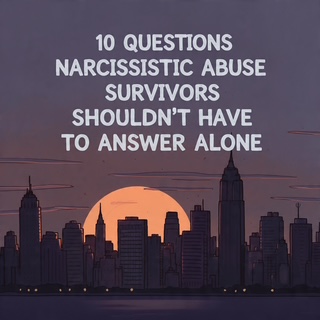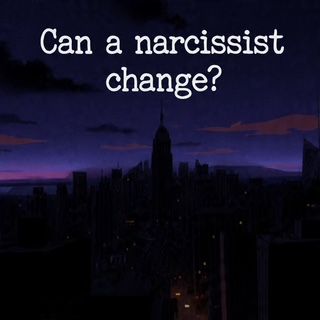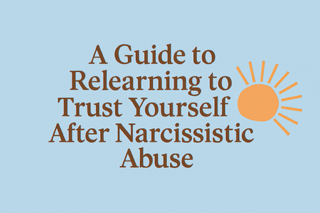5. Why is it so hard to stop thinking about the narcissist who mistreated me?
Rumination and intrusive thoughts and images are common post‑abuse experiences. Think of it as the mind’s attempt at making sense of the unfathomable way the relationship deteriorated or ended. A common symptom of trauma is the presence of intrusive ideas and images related to the mistreatment. Time can collapse and make your nervous system react as though the mistreatment is happening in the present.
Also, if you’ve been systematically bullied into believing things are your fault, you’re going to question your own judgment and perceptions, which can make your mind rev. Narcissistic abuse often involves lying and deception. When the lies are revealed, it can cause a traumatic sense of confusion, mistrust, depersonalization and derealization.
When you’ve been trained to think of the narcissist’s needs to keep the peace and maintain the attachment, you’re likely to feel lost when you no longer have to consider the narcissist’s demands or needs in the same way.
6. Can a narcissist ever truly change — or is that impossible?
The quick answer is…no. However, it’s not impossible under certain rare conditions. Most notably, the individual has to be intrinsically motivated to improve their suffering and has the capacity for true empathy and the ability to sit with and appreciate the perspectives of other people, even if they disagree with the opinion or suffer as a result of differences in perspective. See here for an expanded look into the conditions required for a narcissist to make real changes.
7. Why do I feel guilty for leaving the narcissist, even though I know it was abuse?
Survivor guilt and internalized blame are frequent and deeply painful questions. The way the narcissist operates in a close relationship is by convincing the other person (e.g., a romantic partner or an adult child) that they are to blame for the problems in the relationship. The victim of narcissistic abuse is systematically trained to take on the role of the one who makes constant sacrifices. The narcissist punishes and neglects the other person when a mirror is held up to the narcissist and they are asked to take responsibility. The narcissist is likely to have made you question everything. You might not even know what’s real or not. And if you’ve been trained that everything is your fault AND you can’t trust your own judgment based on the altering of your reality that comes with narcissistic abuse, you’re likely to feel guilty even when you’ve been abused.
8. What should I do if no one believes my account of how the narcissist treated me?
If you’ve been harmed by a narcissist, chances are there are people in your life who discredit or dismiss what you tell them about the narcissist or the abuse. This experience is inevitable and it’s a horribly isolating feeling. Why does this happen so predictably? This generally happens for two reasons. First, narcissists are generally highly adept at hiding the dark and hidden truth. Many of the more overt narcissists tend to be highly charming, charismatic and persuasive. They are often successful and powerful compared to the general population. On the outside, they offer a form of highly desirable social currency and people are easily fooled by their presentation.
Second, the nature of narcissistic abuse is such that people have a hard time grasping the dynamics. It’s so mind bending and insidious that people who hear about the abuse will probably make the abused individual feel blamed if they don’t have some basic information about what narcissistic abuse looks like. Even experienced mental health professionals can invalidate the patient’s recollection of mistreatment by a narcissist. I’ve had so patients recall how their last therapist completely invalidated them or was scared off by the complexity of the dynamics involved in the abuse.
9. So what should I do if people don’t believe me when I share how badly I was treated by a narcissist?
First and foremost, with an awareness of how hard narcissistic abuse is to understand, it’s important to share with people who don’t make you feel blamed or shamed. Sometimes a well-intentioned parent who has supported you through tough times might strike out when trying to support you during or after narcissistic abuse. One empathic, patient and understanding friend can do wonders for you if you need support. Friends can serve as a reality check for you. Let’s say you asked your friend the following after a fight with your partner: “Tell me if I’m crazy, but he (the narcissist in this case) told me it was my fault that he broke my phone.” A trusted and wise friend would make you feel supported and offer a perspective that calmed your overactive guilt, shame and sense of responsibility.
I highly recommend that you seek mental health support from a professional who confirms in a phone call or email that they are competent in treating narcissistic abuse. A therapist can guide you through the process of recovery.
10. Will a narcissist ever regret what they did to me?
This is a painful question for the victim of narcissistic abuse to ponder. Questions about accountability and remorse are extremely common after mistreatment by a narcissist. Narcissists are often limited in their ability to feel remorse. In my article on whether or not narcissists can change, I offer a window into the rare qualities of people with narcissistic tendencies that might predict the ability to change. These qualities might also predict the ability to feel some semblance of remorse and regret. For narcissists, the lack of remorse and coldness will endure forever, even after you’ve distanced yourself from them. If you can connect for a moment with the goodness in you and all you have to offer — your loyalty for example, or how much you’re capable of loving someone, or how really solid people who know you well do show their appreciation of your personality…then you can confidently say to yourself, “This narcissist will NEVER receive my love again. They will never have me again in the same way. And that’s their loss!”
Please feel free to contact me with any questions or to schedule an initial consultation. I would like the opportunity to help you!
Wishing you all the best,
Gregory Kushnick, Psy.D.
Licensed Psychologist in New York City
Tel. 917-566-7312
Chelsea/Flatiron Office
138 West 25th St.
Suite 802-B4
New York, NY 10001
FiDi/Wall St. Office
30 Broad St.
Suite 1433
New York, NY 10004






